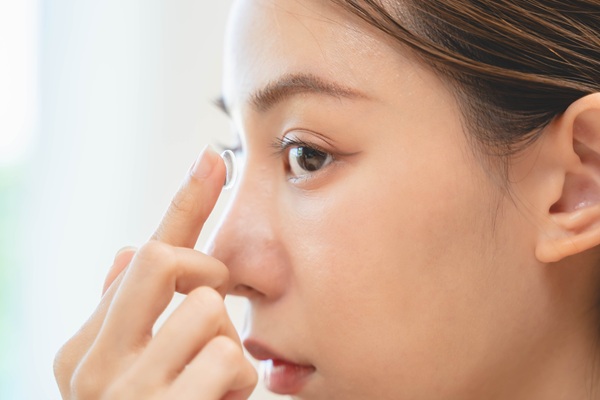Red Eye Treatment Options From an Optometrist

Red eye treatment is often a top concern for patients seeking help from an optometrist. This common eye condition is often treatable at home. However, red eye can be a sign of something more serious that requires the help of an eye doctor. Here we look closer at this condition, its causes, and when to seek red eye treatment.
What is red eye?
Red eye is an umbrella term for varying degrees of red, irritated, or bloodshot eyes. Red eye happens when blood vessels under the eye surface become inflamed, typically reacting to an irritant in the eye. This condition can range from mild to severe and be over quickly or last for days. Other symptoms accompanying red eye may include discharge, swelling, pain, itching, and vision changes.
Why it occurs
Red eye can result from a wide range of issues. For example, fatigue, wearing contacts too long, and eye injuries are common causes of red eye. In addition, infections, underlying conditions, debris, or foreign bodies in the eye can also lead to the condition. It is important to pinpoint the cause because that will usually determine how to treat it. In addition, the cause will help determine whether it can be treated at home or calls for a visit to an eye care professional.
Red eye treatment at home
Patients can do a few things at home to help relieve red eye. Other-the-counter products, such as eye drops, can help alleviate symptoms. Additional suggestions include gently washing or massaging the eyelids or applying cold compresses to the eyes while closed. Sometimes a break from eyewear or giving the eyes a rest is enough to provide relief.
When to see an eye care professional for red eye
Though red eye often resolves on its own or with home care suggestions like the ones above, patients need to know when to see an eye care professional, such as an optometrist, for this condition. According to The Cleveland Clinic, people should see an eye care professional immediately if they have red eye in combination with eye pain, sensitivity to light, blurred vision, or swelling. Other indications that a patient should see an optometrist include:
- Red eye and symptoms lasting more than a week
- Symptoms worsen instead of improve
- Presence of pus from the eyes that dries into crusts.
- A fever along with eye discomfort
- Excessive wateriness of the eyes
- Changes in vision
- Double vision
These can be signs of serious conditions an eye care professional must treat. For example, glaucoma, a condition where pressure building inside the eye can damage the optic nerve, may lead to blindness if not treated. Uveitis, inflammation affecting the inner eye, is another condition that affects vision and requires medical attention. In addition, scratches or abrasions to the eye may require treatment to prevent infection.
How an optometrist treats red eye
Because there can be many causes of it, red eye treatment will vary from patient to patient. Optometrists are skilled in diagnosing and treating a wide range of eye conditions and have special equipment for examining the eyes and checking for signs of damage or disease. The optometrist will examine the eyes and run a series of tests. In addition, they will conduct a thorough exam, ask detailed questions about their symptoms, and consider any other relevant information, such as health history and medications.
Depending on what they find, the optometrist will either recommend a course of treatment or refer the patient to an ophthalmologist. An optometrist acts as a primary care provider for the eyes, treating and managing certain conditions and infections. Depending on the patient, the optometrist may recommend medication, changes to eyewear, lifestyle adjustments, or a combination of these interventions. However, for more serious eye conditions, the optometrist is likely to refer the patient to a medical doctor known as an ophthalmologist who handles serious eye diseases and surgical intervention.
When to see an eye care professional for red eye treatment
Red eye typically resolves on its own or with home care or over-the-counter products. However, if the red eye does not improve, worsens, or is accompanied by other troubling symptoms, it may be time to see an optometrist. Delaying getting a diagnosis and the needed medical care can have serious consequences for your health and the health of your eyes. Let us help identify what is causing your red eye and see that you get the right treatment.
Request an appointment here: https://www.texasoptical.net or call Texas Optical at (214) 771-7333 for an appointment in our Dallas office.
Check out what others are saying about our services on Yelp: Read our Yelp reviews.
Recent Posts
For those living with diabetes, undergoing a diabetic eye exam is one of the most important steps in protecting their vision and overall eye health. High blood sugar levels can lead to a range of complications, including conditions that damage the eyes over time. These exams help detect these issues before they become serious, allowing…
Contact lenses provide clear vision and convenience for individuals who prefer an alternative to eyeglasses. However, proper care and maintenance are essential to prevent infections, irritation, and eye damage. Neglecting hygiene practices can lead to serious eye conditions, including corneal ulcers and keratitis. Understanding how to clean, store, and handle contact lenses ensures long-term eye…
Maintaining eye health and preventing long-term issues is the result of consistent and quality vision care. Many people focus on overall wellness but may overlook daily habits that support healthy eyesight. However, taking simple steps each day can protect vision, reduce eye strain, and prevent future complications. By making eye health a priority, it is…
Prescription contacts provide vision correction, comfort, and convenience for those who do not want to wear glasses. However, caring for and wearing contacts takes some getting used to. Learning to insert, remove, and maintain them will help ensure a comfortable and safe experience.Not all contact lenses are the same, and choosing the right pair is…


